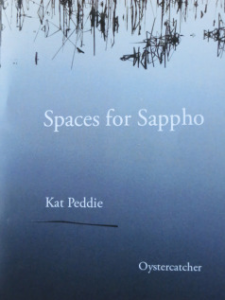Kat Peddie’s Spaces for Sappho, hot off the press from Oystercatcher, is impossible to categorise (and only an idiot would want to). The pamphlet’s 21 pages contain a mercurial mix of translation, versions, original poems and responses to other translations, all converging on the mysterious absent centre of the historical, textual Sappho. The effect is unsettling, vibrant and seriously moreish.
Out of Everywhere 2
Twenty years ago, Reality Street published one of the most influential poetry anthologies of our time. Out of Everywhere showcased linguistically innovative poetry by women in the UK and North America, definitively blowing apart the myth that experimental poetry is the preserve of shouty men in pubs. The range and quality of poetry in the book was extraordinary, and it’s as fresh today as it was in 1996 (to-date my copy has been to six countries across three continents, read on land, sea and air, and still retains the ability to surprise and startle). It has also influenced a generation of poets to push the boundaries of form and to believe in an audience for daring work. In short, it’s a hard act to follow. Continue reading
The world and the child: Peter Philpott
Peter Philpott’s Ianthe Poems is dedicated to the poet’s granddaughter, and many of the poems play with personae that might credibly be identified with the poet or the young Ianthe. There have been many poems — and indeed whole collections — about parenthood over recent decades, but notably fewer structured around grandparenthood. Continue reading
Two poems by Emily Critchley
Emily Critchley has written some of the most exciting and dynamic poetry to come out of the UK in recent years, as well as editing Reality Street’s keenly-anticipated Out of Everywhere 2. Here’s a closer look at two poems, both reproduced by kind permission of the author. Continue reading
Opera & Drama
Last week was bookended by opera. On Monday I sent composer Philip Sunderland the second full draft of the libretto for our March 2016 collaboration The Glass Knight, and on Friday I experienced the closest thing to secular transfiguration at the opening night of Longborough Festival Opera‘s magnificent Tristan und Isolde. Continue reading
Welsh Modernism
For some people modernism ends with The Waste Land and a handful of extracts from the Cantos, after which poetry returns to its proper course via the Movement, Hughes, Heaney, the New Generation and onwards to today’s dominant voices.
The counter-position is that modernism never went away, and that (often at a distance from literary London) it produced some of the most powerful work of the past century: MacDiarmid in Scotland, Bunting in Northumbria, Hill & Prynne in their different orbits around Cambridge. Continue reading
Katabasis: Three Underworlds
I’m delighted that Modern Poetry in Translation have chosen my versions of three descents to the classical underworld as their featured poem of the month. You can read the poems here (and I’d also recommend exploring the wealth of other poems available on the MPT website). Continue reading
Cheltenham calling…
The Cheltenham Poetry Festival started in earnest yesterday. In a spectacular piece of bad timing, I spent the day on a flight to the US for my day-job and will be out of the country for most of the festival before heading to Cheltenham on Sunday 3rd May for our latest Rewiring History live event followed by a joint reading with Claire Trévien. Which means I’m going to miss out on some fantastic poetry in the intervening 10 days. Continue reading
Close Reading: An Education in Silence
The longer I spend in poetry’s experimental borderlands in pursuit of linguistic monsters and verbal wizardry, the greater the importance of making regular visits back to the lyric mainstream to remember that skilled, nuanced, exciting poems aren’t the sole preserve of any single tradition. Here’s a wonderful dramatic monologue from Jessica Traynor’s collection Liffey Swim, reproduced here by kind permission of the author. Continue reading
Close Reading: Snowclone Detritus
Over the past few years Peter Hughes has been publishing versions of Petrarch’s sonnets in concentrated pamphlet-sized bundles from a range of different small presses. I’ve been immersed in these for several weeks now with increasing enjoyment and admiration. I took Snowclone Detritus (Knives, Forks & Spoons Press, 2013) on a recent work trip to America and had already decided to post a close reading of one of the poems when, yesterday morning, the just-published complete collection from Reality Street, Quite Frankly: After Petrarch’s Sonnets, dropped through the letterbox as the first installment of the 2015 Reality Street supporter scheme. Continue reading

